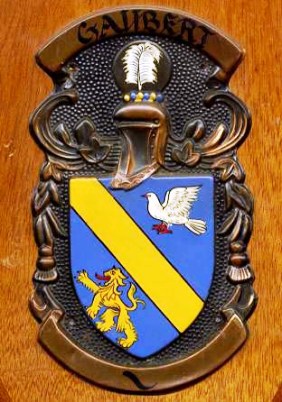UGLICH ARCHIVE DEPARTMENT LETTER TO JANET HALL (dated 25.07.97)
Henry GAUBERT lived in Uglich from 1845 where he was invited to work on the Uglich Paper Mill as a master mechanic. In 1857 he apparently bought the Uleiminsk Paper Mill, not far from Uglich, jointly with merchants Vyzhilovs (in Russian terminology Gaubert was called Andrei). After buying the mill he enrolled in the Uglich Merchants as a merchant of the third guild. In Russia there were three guilds of merchants depending on the amount of capital one had. Henry had a son Ebenezer. In 1856 John Peter GAUBERT bought the Uglich Paper Mill (in Russian terminology Egor Ivanovich) jointly with the merchant Vargunin and a civil servant, Bannister. Henry Robert GAUBERT was a native of Watford and John Peter was from Clapham. John Peter died in Uglich. His son, John Nicholas, as a director of the mill followed him and he held office until 1912. In 1912 the mill burned down and has not been restored. NB - the name ' Henry' Gaubert must be wrong. It is probably George Manners Gaubert Uglich Archive Department letter to myself dated 06.08.97 I asked for a copy of the file held by the Archive Department but there was no photocopier in the town. It eventually arrived almost one year later and is written in old Cyrillic script. It comprises thirty-one files. It was accompanied by a brief translation of the more important points from E.V.Kolotilova, Director Of Archives in Uglich. The Halls have also received a copy of the files. The contents of the letter are broadly the same as the above letter to Janet. It adds –
1. GAUBERT was spelt as GOVARD
2. Henry retained his British citizenship
3. his son Ebenezer was the / a manager
4. Vargunin was from St. Petersburg
5. John Peter married three times
6. his third wife was Anna Maria Sarah nee Manners
7. his children were George Manners, John Nicholas, Henry Frederick, Elizabeth Sarah, Robert Gabriel, Albert Robert, and Peter Alfred Martin
8. the bundle of documents relating to the company mostly concern the period 1865 -1883, and also contains Henry's admission to the guild, and John Peter's will
9. the inspector of the Uglich paper factory during the 1870s was Konstantin Krupskii. His daughter Nadezhda, Konstantinova Krupskaia (26.02.1869 – 22.02.1939) who also lived in Uglich. In 1894 she met V.I. Lenin, the organiser of the October Revolution and leader of Soviet Russia from 1917 - 1924. In 1896 she was arrested for Marxist activities and exiled to Bashkina, Siberia for three years. She married Lenin in 1898. Nadezhda Krupskaya / Krupskaia became Chief Minister of Education of Soviet Russia and founded the Soviet library system.
NB - we have no trace of an 'Ebenezer GAUBERT' so conclude it refers to George Manners GAUBERT's daughter, Elizabeth who married a Hoeltzer of Uglich.
From Wikipedia - Nadezhda Konstantinovna "Nadya" Krupskayabig Russian: Наде́жда Константи́новна Кру́пская, scientific transliteration Nadežda Konstantinovna Krupskaja) (26 February O.S. 14 February 1869 - February 27, 1939) was a Russian Bolshevik revolutionary. She was the daughter of Konstantin Ignat'evich Krupsky, who was orphaned in 1847 at nine years of age. He became a military officer but later had democratic sympathies. He was educated and given a commission as an infantry officer in the Russian Army. Just before leaving for his assignment in Poland he married Nadya's mother.
Nadya's mother, Elizaveta Vasilyevna Tistrova was the daughter of landless nobles. Elizaveta's parents died when she was young and she was enrolled in the Bestuzhev Courses, which happened to be the highest formal education available to women in Russia during this time. After earning her degree Elizaveta went on to work as a governess for noble families until she married Krupsky.
After six years of service, Krupsky lost favor with his supervisors and was charged with "un-Russian activities." He may have been suspected of being involved with revolutionaries. Following this time he worked in factories or wherever he could find work until later in life when he was recommissioned just before his death.
Nadya Krupskaia joined Marxist student groups in 1890, while attending the Advanced Courses for Women in St. Petersburg. From 1891 to 1896 she taught at an evening and weekend school outside the Neva Gate (Nevskaia Zastava) and spread revolutionary propaganda among the workers. In 1894 she met V. I. Lenin. In 1895 she helped organize and worked in the St. Petersburg Union of Struggle for the Emancipation of the Working Class. Arrested in August 1896, she was sentenced in 1898 to three years of exile in Ufa Province, which was changed at her request to exile in the village of Shushenskoe, Eniseisk Province, where Lenin was in exile; there, Krupskaia became his wife.
The Russians have asked for any information, which the family may have concerning the family and the mill including any photographs. Their request appears genuine, as there is a modest exhibition of old Uglich in one of the churches. They seem to have found an appetite for their past and are keen to collaborate with those who had had connections with their history. They repeated their request in the papers sent to me after my visit to Uglich. I have yet to find somebody who can translate the old Cyrillic script and it has been suggested that the task could cost some £800 -1,000. I've not given this a high priority so it can wait for the time being.
